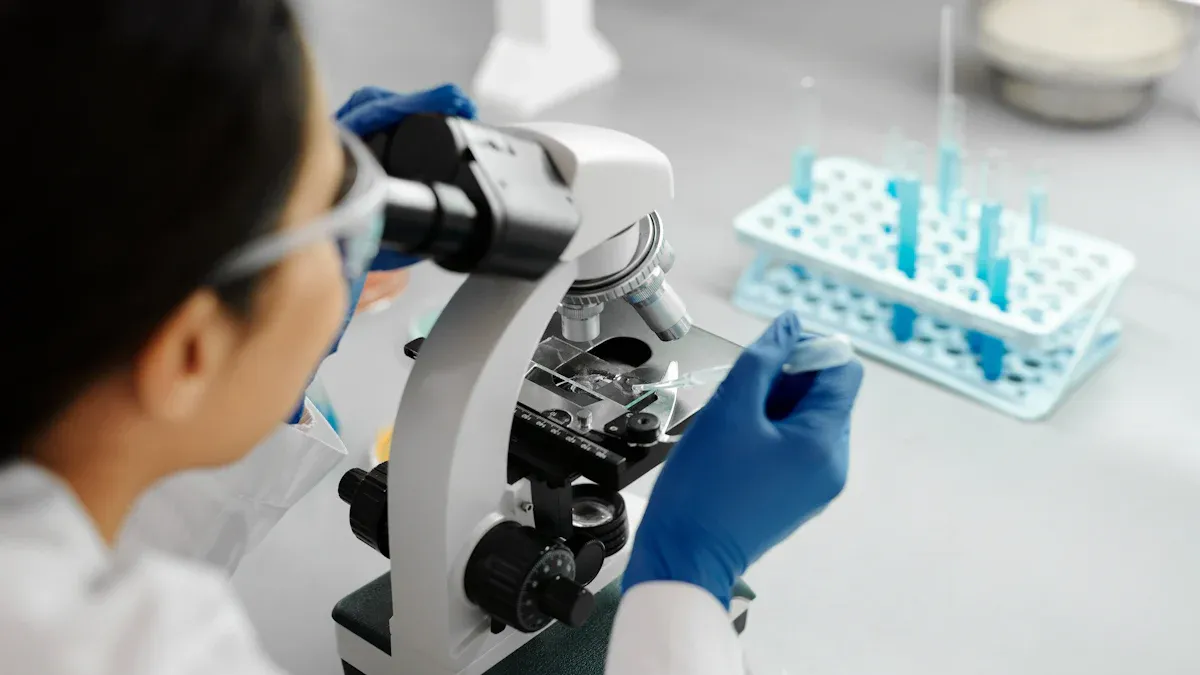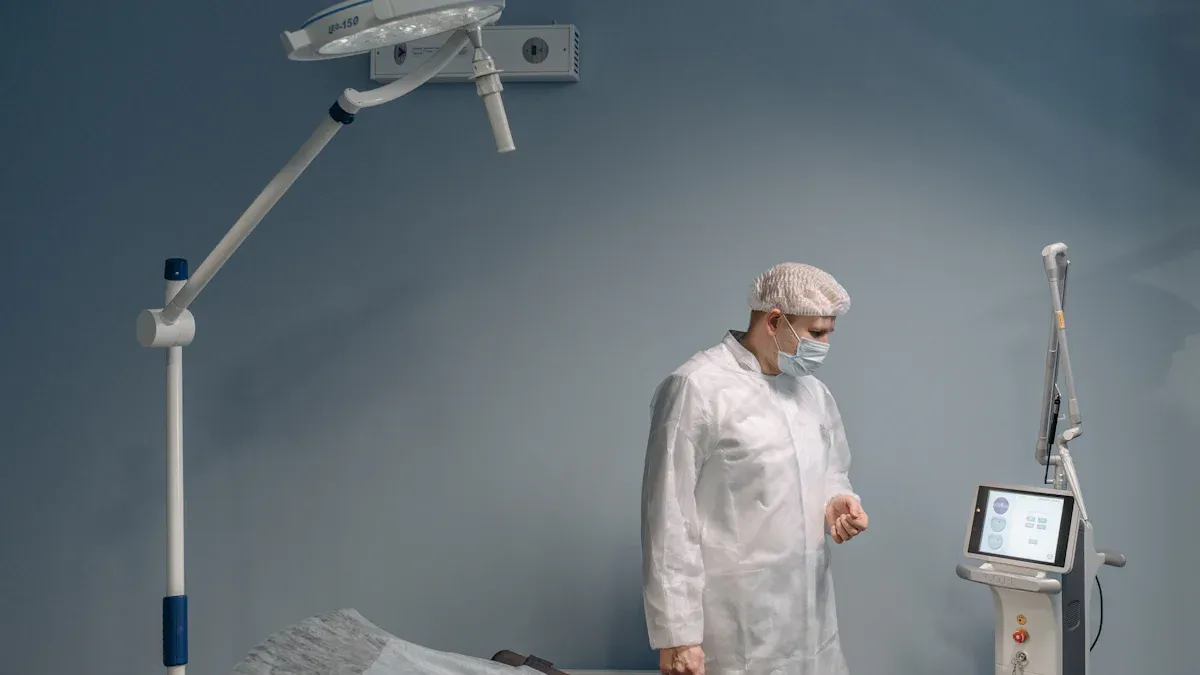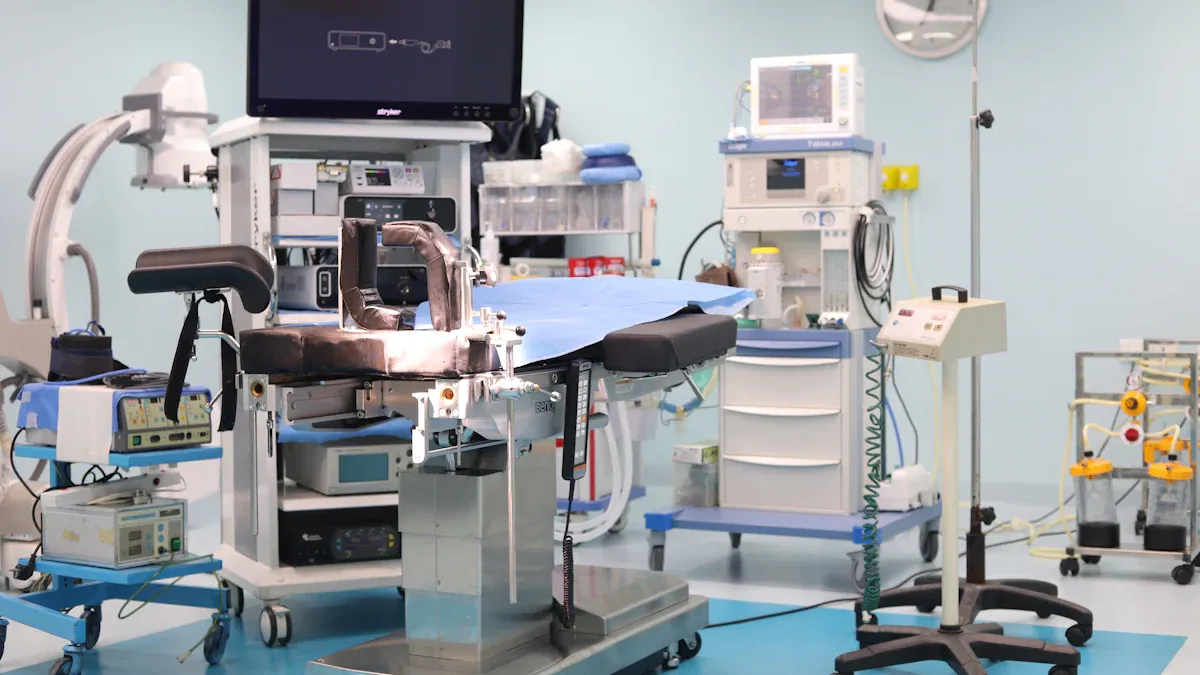Why Nitinol Tubing is Vital for Advanced Medical Applications

Nitinol tubing plays a transformative role in modern healthcare. Its unique properties, such as shape memory and superelasticity, enable medical devices to perform with unmatched precision and reliability. For instance, advancements in manufacturing techniques have significantly improved the fatigue life of nitinol components, making them ideal for cardiovascular applications. These innovations ensure safer, longer-lasting solutions for patients. AccuPath’s nitinol tubing exemplifies this excellence, offering superior quality and performance for cutting-edge medical technologies. By leveraging nitinol’s biocompatibility and corrosion resistance, healthcare providers can deliver more effective treatments and enhance patient outcomes.
Key Takeaways
Nitinol tubing can remember shapes and bend easily. This helps medical tools work well inside the body.
It is safe for the body and does not rust. This makes it great for implants that stay in the body for a long time.
Careful manufacturing makes strong and reliable Nitinol tubing. This improves how medical tools work and last.
Nitinol helps with small surgeries, making recovery quicker and patients feel better.
More people need Nitinol in healthcare, leading to new ideas. This helps create better medical tools for patient care.
Unique Properties of Nitinol Tubing

Shape Memory and Superelasticity
Nitinol tubing stands out due to its remarkable shape memory properties and superelastic behavior. These features enable medical devices to adapt to dynamic environments within the human body. Shape memory properties allow the nickel-titanium alloy to return to its original form after deformation, ensuring consistent performance. Superelastic properties provide flexibility and durability, allowing the material to endure significant strain without permanent damage.
To validate these properties, manufacturers employ rigorous testing methods. For instance, the Differential Scanning Calorimeter (DSC) test measures transformation temperatures, ensuring the alloy performs optimally under varying conditions. The Bend Free Recovery (BFR) test assesses shape recovery by deforming the material and measuring its recovery temperature. Tensile testing evaluates the tubing’s ability to withstand stress while maintaining its superelastic behavior.
Test Method | ASTM Standard | Description |
|---|---|---|
Differential Scanning Calorimeter (DSC) | ASTM F2004 | Measures transformation temperatures of Nitinol alloys. |
Bend Free Recovery (BFR) Test | ASTM F2082 | Assesses shape recovery by deforming the material. |
Tensile Testing | ASTM F2516 | Evaluates tensile properties and superelastic behavior. |
AccuPath’s Nitinol tubing leverages these validated properties to deliver reliable solutions for advanced medical applications.
Biocompatibility and Corrosion Resistance
Biocompatibility is a critical factor in medical devices, and Nitinol excels in this area. Its corrosion resistance ensures long-term stability within the human body, reducing the risk of allergic reactions or material degradation. Compared to stainless steel or titanium alloys, Nitinol offers superior biocompatibility, making it ideal for implants and other devices requiring prolonged contact with biological tissues.
Nitinol’s ability to resist fatigue and maintain its structural integrity under repeated stress further enhances its suitability for medical applications. This exceptional performance ensures safer and more effective treatments for patients. AccuPath’s Nitinol tubing exemplifies these qualities, providing healthcare providers with dependable solutions that prioritize patient safety.
Precision Manufacturing for Medical Devices
Precision manufacturing is essential for creating high-quality Nitinol tubing. AccuPath employs advanced techniques to ensure dimensional accuracy and surface quality. Outer diameter control during die drawing operations maintains the tubing’s structural integrity. Die optimization, including the use of polycrystalline diamond (PCD) dies, ensures high concentricity and smooth finishes.
Stringent testing procedures at every stage of production verify mechanical behavior, dimensional accuracy, and regulatory compliance. Controlling oxygen and carbon content in the melt prevents the formation of titanium oxides and carbides, which could compromise the tubing’s performance. These meticulous processes guarantee that AccuPath’s Nitinol tubing meets the highest standards of reliability and precision, making it a trusted choice for medical device manufacturers.
"Precision in manufacturing is not just a requirement; it is the foundation of reliability in medical devices. AccuPath’s commitment to quality ensures that every Nitinol tubing product delivers exceptional performance and durability."
Applications of Nitinol in Medical Devices

Stents and Vascular Implants
Nitinol has revolutionized cardiovascular applications, particularly in the development of stents and vascular implants. Its shape memory and superelasticity allow stents to expand precisely within blood vessels, restoring proper blood flow. These properties also enable stents to adapt to the dynamic movements of the vascular system, reducing the risk of restenosis and improving patient outcomes.
Manufacturers rely on stringent performance metrics to ensure the reliability of nitinol stents. Key metrics include material composition, dimensional accuracy, and surface quality. For example:
Performance Metric | Description |
|---|---|
Material Composition | Variations in nickel-titanium alloy content affect shape memory and mechanical properties. |
Dimensional Accuracy | Ensures stents meet exact size and shape requirements for proper deployment and functionality. |
Surface Quality | Smooth finishes enhance biocompatibility and reduce infection risk. |
AccuPath’s advanced stent technology leverages these metrics to deliver high-performance solutions. Its nitinol tubing ensures precise manufacturing and exceptional durability, making it a trusted choice for vascular implants.
Guidewires and Catheters
Guidewires and catheters demand flexibility, durability, and reliability—qualities that nitinol tubing provides in abundance. Nitinol’s superelasticity allows guidewires to navigate complex anatomical structures with ease, while its shape memory ensures the guidewire returns to its original form after deformation. These features enhance procedural efficiency and reduce the risk of complications.
Nitinol in medical devices like guidewires has shown superior performance compared to other materials. Its ability to withstand repeated stress without losing functionality makes it indispensable in minimally invasive procedures. AccuPath’s nitinol tubing offers unmatched precision and consistency, ensuring guidewires perform flawlessly in even the most challenging scenarios.
Orthopedic and Dental Implants
Orthopedic and dental implants benefit significantly from nitinol’s unique properties. Its shape memory and superelasticity provide enhanced stability and adaptability, ensuring implants conform to the patient’s anatomy. Studies have shown that cleaner grades of nitinol exhibit higher fatigue life, making them ideal for long-term use in biomedical implants.
"The high-cycle fatigue limit of nitinol is influenced by the volume of stressed material, which is critical for the reliability of medical devices."
AccuPath’s nitinol tubing meets the rigorous demands of orthopedic and dental applications. Its superior biocompatibility and corrosion resistance ensure implants remain safe and effective over time, improving patient outcomes and quality of life.
Surgical Instruments
Nitinol tubing has become a game-changer in the development of advanced surgical instruments. Its unique properties, including flexibility and durability, allow surgeons to perform procedures with unmatched efficiency and accuracy. These qualities make nitinol an essential material for tools used in minimally invasive surgeries, where precision and reliability are critical.
Surgical instruments crafted with nitinol tubing offer several advantages:
Nitinol's flexibility ensures smooth navigation through complex anatomical structures, reducing the risk of tissue damage.
Its durability allows instruments to withstand external forces during insertion or removal, maintaining their structural integrity.
The material's superelasticity enables instruments to adapt to challenging surgical environments without permanent deformation.
These features enhance surgical precision, enabling healthcare professionals to achieve better outcomes for their patients. Instruments such as graspers, forceps, and scissors benefit from nitinol's ability to maintain sharpness and functionality over extended use. This reliability minimizes the need for frequent replacements, reducing costs and improving operational efficiency in medical facilities.
AccuPath’s nitinol tubing exemplifies excellence in surgical instrument manufacturing. Its precision-engineered tubing ensures consistent performance, even under the most demanding conditions. By leveraging advanced manufacturing techniques, AccuPath delivers tubing with superior dimensional accuracy and surface quality. These attributes make it the preferred choice for medical device manufacturers seeking to create high-performance surgical tools.
"When precision and reliability matter most, nitinol tubing provides the foundation for surgical instruments that redefine patient care."
The integration of nitinol into surgical instruments represents a significant leap forward in medical technology. With AccuPath’s expertise, healthcare providers can trust that their tools will deliver exceptional results, ensuring safer and more effective treatments.
Advantages of Nitinol Tubing for Patient Outcomes
Minimally Invasive Procedures
Nitinol tubing has become a cornerstone of minimally invasive procedures, offering unmatched flexibility and durability. Its superelasticity allows medical devices to navigate complex anatomical pathways with ease, reducing the risk of tissue damage. This adaptability ensures that procedures are less invasive, leading to faster recovery times and improved patient outcomes.
For example, nitinol in medical devices like guidewires and catheters enables precise control during cardiac interventions. This precision minimizes the risk of vessel damage, enhances patient safety, and reduces overall procedure times. By leveraging these properties, AccuPath’s nitinol tubing empowers healthcare providers to deliver safer and more effective treatments.
"Minimally invasive procedures are redefining patient care, and nitinol tubing plays a pivotal role in this transformation."
Enhanced Device Longevity
The durability of nitinol tubing significantly extends the lifespan of medical devices, ensuring long-term implant performance. Its resistance to fatigue and corrosion makes it ideal for biomedical implants, such as cardiovascular stents and orthopedic devices. Studies comparing tube processing methods highlight the material’s exceptional fatigue life:
Tube Processing Method | Fatigue Life Insights |
|---|---|
TM-1 | Correlated with microstructural aspects and fatigue behaviors. |
TM-2 | Compared against TM-1 to assess fatigue life improvements. |
AccuPath’s advanced manufacturing techniques further enhance the durability of nitinol tubing, ensuring it meets the rigorous demands of modern healthcare. This reliability translates to fewer device replacements, reduced costs, and better patient outcomes.
Supporting Innovation in Healthcare
Nitinol tubing drives innovation in healthcare by enabling the development of cutting-edge medical devices. Its unique properties allow for complex geometries and customized designs, particularly in cardiovascular applications and biomedical implants. Additive manufacturing technologies have revolutionized nitinol stent production, facilitating rapid prototyping and improving production efficiency.
Key trends in nitinol innovation include:
Transforming medical implant technology with remarkable biocompatibility and corrosion resistance.
Enhancing long-term implant performance, leading to better patient care.
Supporting the creation of advanced surgical tools that improve surgical precision.
AccuPath’s nitinol tubing exemplifies these advancements, offering unparalleled quality and performance. By partnering with AccuPath, medical device manufacturers can stay at the forefront of innovation, delivering solutions that improve patient outcomes and redefine healthcare standards.
The Future of Nitinol Tubing in Medical Technology
Emerging Applications
Nitinol continues to redefine possibilities in medical technology, with emerging applications showcasing its transformative potential. Its unique properties, such as shape memory and superelasticity, make it indispensable for next-generation devices. As healthcare evolves, nitinol is finding new roles in areas like robotic-assisted surgeries, where precision and flexibility are paramount. Its ability to adapt to complex movements enhances the performance of robotic instruments, enabling surgeons to achieve unparalleled accuracy.
The growing demand for minimally invasive procedures further drives innovation. Nitinol in medical devices, such as advanced catheters and micro-scale implants, is enabling treatments that were once considered impossible. For example, its biocompatibility and durability make it ideal for drug-eluting implants, which deliver targeted therapies while maintaining structural integrity over time.
The market for nitinol-based devices is expanding rapidly. Projections indicate a compound annual growth rate (CAGR) of 8.5% to 10.6% over the next decade, with the market expected to reach USD 35.56 billion by 2030. This growth reflects the increasing prevalence of diseases requiring advanced treatments and the rising adoption of innovative medical technologies. AccuPath’s nitinol tubing is at the forefront of these advancements, offering precision-engineered solutions that meet the demands of emerging applications.
Research and Development
Ongoing research and development are unlocking new frontiers for nitinol in healthcare. Scientists are exploring advanced alloys and manufacturing techniques to enhance its performance. For instance, innovations in additive manufacturing are enabling the creation of complex geometries, expanding the scope of nitinol applications. These advancements are particularly impactful in cardiovascular devices, where precision and reliability are critical.
The global focus on improving patient outcomes has accelerated research into nitinol’s fatigue resistance and biocompatibility. Studies highlight its superior durability compared to traditional materials, making it a preferred choice for long-term implants. Researchers are also investigating surface treatments to further enhance its corrosion resistance, ensuring devices remain safe and effective over extended periods.
The rising demand for minimally invasive surgeries underscores the importance of nitinol’s unique properties. Its flexibility and adaptability are driving the development of next-generation stents, guidewires, and orthopedic implants. AccuPath’s commitment to innovation ensures its nitinol tubing remains a trusted choice for medical device manufacturers. By leveraging cutting-edge research, AccuPath delivers products that set new benchmarks in quality and performance.
"Innovation in nitinol technology is shaping the future of healthcare. AccuPath’s dedication to excellence ensures that medical professionals have access to the most reliable and advanced solutions."
Nitinol tubing has become a cornerstone of modern medical devices, driving advancements that improve patient outcomes. Its unique properties, such as shape memory and superelasticity, have enabled revolutionary applications in stents, guidewires, implants, and surgical instruments. These innovations have transformed healthcare by making treatments safer, more effective, and less invasive.
Nitinol guidewires enhance minimally invasive procedures, reducing risks and recovery times.
Nitinol implants adapt to bodily changes, ensuring long-term performance and fewer replacements.
Nitinol stents provide reliable solutions for vascular conditions, improving clinical outcomes.
The growing demand for nitinol components has spurred manufacturers to refine production practices and invest in supply chains, ensuring rapid industry responses. AccuPath’s nitinol tubing exemplifies this progress, offering precision-engineered solutions that meet the highest standards. As medical technology evolves, nitinol will remain at the forefront, driving the development of next-generation devices that redefine patient care.
"AccuPath’s commitment to quality ensures that healthcare providers can rely on nitinol tubing to deliver exceptional results, enhancing patient outcomes and advancing medical innovation."
FAQ
What makes Nitinol tubing unique for medical applications?
Nitinol tubing offers shape memory, superelasticity, and biocompatibility. These properties ensure medical devices perform reliably under stress and adapt to the human body. AccuPath’s Nitinol tubing exemplifies these qualities, providing precision-engineered solutions that enhance patient care and device longevity.
How does AccuPath ensure the quality of its Nitinol tubing?
AccuPath employs advanced manufacturing techniques and rigorous testing. Processes like die optimization and tensile testing ensure dimensional accuracy and durability. This commitment to quality makes AccuPath’s Nitinol tubing a trusted choice for medical device manufacturers.
Tip: Choosing high-quality Nitinol tubing reduces device failure risks and improves patient outcomes.
Why is Nitinol tubing ideal for minimally invasive procedures?
Nitinol’s flexibility and superelasticity allow devices to navigate complex anatomical pathways with ease. These properties minimize tissue damage and enhance procedural precision. AccuPath’s Nitinol tubing supports minimally invasive technologies, enabling safer and more effective treatments.
Can Nitinol tubing improve the longevity of medical devices?
Yes, Nitinol’s resistance to fatigue and corrosion ensures long-term performance. Devices made with AccuPath’s Nitinol tubing require fewer replacements, reducing costs and improving patient satisfaction.
What role does Nitinol play in healthcare innovation?
Nitinol drives advancements in medical technology by enabling complex designs and next-generation devices. AccuPath’s expertise in Nitinol tubing supports innovation, helping manufacturers create solutions that redefine patient care.
Note: Partnering with AccuPath ensures access to cutting-edge Nitinol tubing for advanced medical applications.

